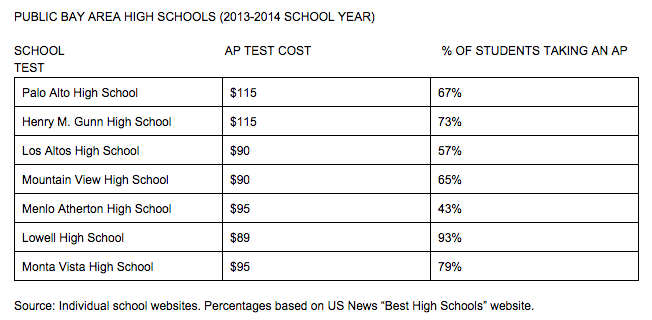The Palo Alto High School administration has decided to lower the cost of taking an Advanced Placement test on campus after learning that it was overcharging students in previous years. The cost will now be $105 per test, a $10 reduction from last year’s fee, according to the schools website. AP Chinese and Japanese will be $135 per test, also a $10 reduction from last year’s fee.
The decision to lower the cost sprung from information that Paly was overcharging its students, and was charging more than most other schools in the Bay Area, as described in a previous Paly Voice article.
“The administration, after looking at the numbers discussed with The Paly Voice over the last few weeks, felt comfortable lowering the price of the exams for the year and will review the pricing annually,” Assistant Principal Jerry Berkson said.

The College Board charged $89 per test in 2014, but many schools added on a sum of money to cover supplies needed to administer the test. With tests costing $115 in 2014, Paly collected an extra $26 per test.
Some of that money went to funding AP testing-related resources such as proctors and supplies. However, data provided by Paly administrators revealed that the school had a remaining sum of money from the AP tests and that those excess funds were used to buy a range of general school supplies such as dry erase markers for classrooms and technical equipment not directly related to the AP tests themselves.
The numbers recorded by the Paly administration in the schools testing fund for the 2014 AP tests were:
Collected testing fees: $159,438.58
Cost of exams: $112,707
Proctors: $17,719.52
Additional fees*: $4,063.68
That results in $24,948.38 leftover after proctors and additional fees had been paid for. With the amount of money paid per test in 2014 at Paly, the school could have charged $105 per test and still have had money remaining.
For this spring, the College Board increased the testing cost to $91, meaning Paly will make $14 per test instead of last years $26.
Paly administration will not know exactly how much extra money it has until all tests have been paid for and taken, and risks losing money with its lowered cost, but its new cost of $105 per test will still be higher than most Bay Area schools.
Many students were unaware of the additional cost charged to them in 2014, and do not believe the school should have been able to use AP testing funds for things unrelated to the test themselves.
“I’d like to know beforehand if what I am paying is partially a donation,” senior Conner Harden said. “Palo Alto schools should only make the students in AP classes pay the bare minimum for the cost of the test. If a student likes, they can donate money to the school, but not without being notified.”
Parents, who generally pay for AP tests for their students, were surprised by the additional charge of an AP test and do not believe the schools should continue to overcharge them.
“With so many years of data, Paly and Gunn should be able to forecast these expenses fairly accurately,” Paly alumni parent Liz Raffel said. “There’s really no excuse for excess profits in the amounts mentioned, and it’s just wrong for AP test-takers to be funding, unknowingly, general supplies for the entire school.”
Another Paly alumni parent, Katharine Glazier, echoes Raffel’s sentiments.
“It seems that the school has unfairly made a nice bit of money off the backs of the AP students and their parents,” Glazier said.
AP test takers are appreciative that the administration has made the effort to lower the cost following last year’s dramatic over-charge.
“It wasn’t okay for them to overcharge us, but I’m glad the administration has realized its mistake and has decided to lower the cost,” senior Olivia Johnson said. “For students taking AP tests, this will make a difference.”
*Additional fees include custodial staff costs during AP testing, testing supplies such as snacks, tech support, headphones for listening portions of certain AP tests and AP Conference costs (teachers attend training before they can teach an AP course).


